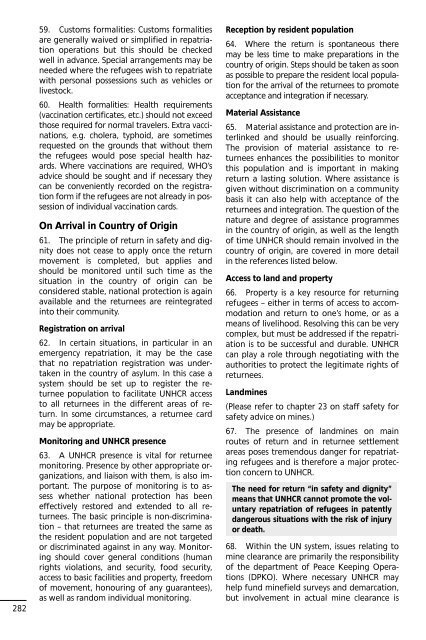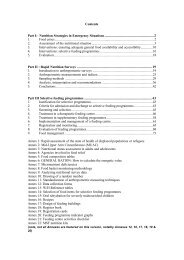UNHCR Handbook for Emergencies - UNHCR eCentre
UNHCR Handbook for Emergencies - UNHCR eCentre
UNHCR Handbook for Emergencies - UNHCR eCentre
Create successful ePaper yourself
Turn your PDF publications into a flip-book with our unique Google optimized e-Paper software.
282<br />
59. Customs <strong>for</strong>malities: Customs <strong>for</strong>malities<br />
are generally waived or simplified in repatriation<br />
operations but this should be checked<br />
well in advance. Special arrangements may be<br />
needed where the refugees wish to repatriate<br />
with personal possessions such as vehicles or<br />
livestock.<br />
60. Health <strong>for</strong>malities: Health requirements<br />
(vaccination certificates, etc.) should not exceed<br />
those required <strong>for</strong> normal travelers. Extra vaccinations,<br />
e.g. cholera, typhoid, are sometimes<br />
requested on the grounds that without them<br />
the refugees would pose special health hazards.<br />
Where vaccinations are required, WHO’s<br />
advice should be sought and if necessary they<br />
can be conveniently recorded on the registration<br />
<strong>for</strong>m if the refugees are not already in possession<br />
of individual vaccination cards.<br />
On Arrival in Country of Origin<br />
61. The principle of return in safety and dignity<br />
does not cease to apply once the return<br />
movement is completed, but applies and<br />
should be monitored until such time as the<br />
situation in the country of origin can be<br />
considered stable, national protection is again<br />
available and the returnees are reintegrated<br />
into their community.<br />
Registration on arrival<br />
62. In certain situations, in particular in an<br />
emergency repatriation, it may be the case<br />
that no repatriation registration was undertaken<br />
in the country of asylum. In this case a<br />
system should be set up to register the returnee<br />
population to facilitate <strong>UNHCR</strong> access<br />
to all returnees in the different areas of return.<br />
In some circumstances, a returnee card<br />
may be appropriate.<br />
Monitoring and <strong>UNHCR</strong> presence<br />
63. A <strong>UNHCR</strong> presence is vital <strong>for</strong> returnee<br />
monitoring. Presence by other appropriate organizations,<br />
and liaison with them, is also important.<br />
The purpose of monitoring is to assess<br />
whether national protection has been<br />
effectively restored and extended to all returnees.<br />
The basic principle is non-discrimination<br />
– that returnees are treated the same as<br />
the resident population and are not targeted<br />
or discriminated against in any way. Monitoring<br />
should cover general conditions (human<br />
rights violations, and security, food security,<br />
access to basic facilities and property, freedom<br />
of movement, honouring of any guarantees),<br />
as well as random individual monitoring.<br />
Reception by resident population<br />
64. Where the return is spontaneous there<br />
may be less time to make preparations in the<br />
country of origin. Steps should be taken as soon<br />
as possible to prepare the resident local population<br />
<strong>for</strong> the arrival of the returnees to promote<br />
acceptance and integration if necessary.<br />
Material Assistance<br />
65. Material assistance and protection are interlinked<br />
and should be usually rein<strong>for</strong>cing.<br />
The provision of material assistance to returnees<br />
enhances the possibilities to monitor<br />
this population and is important in making<br />
return a lasting solution. Where assistance is<br />
given without discrimination on a community<br />
basis it can also help with acceptance of the<br />
returnees and integration. The question of the<br />
nature and degree of assistance programmes<br />
in the country of origin, as well as the length<br />
of time <strong>UNHCR</strong> should remain involved in the<br />
country of origin, are covered in more detail<br />
in the references listed below.<br />
Access to land and property<br />
66. Property is a key resource <strong>for</strong> returning<br />
refugees – either in terms of access to accommodation<br />
and return to one’s home, or as a<br />
means of livelihood. Resolving this can be very<br />
complex, but must be addressed if the repatriation<br />
is to be successful and durable. <strong>UNHCR</strong><br />
can play a role through negotiating with the<br />
authorities to protect the legitimate rights of<br />
returnees.<br />
Landmines<br />
(Please refer to chapter 23 on staff safety <strong>for</strong><br />
safety advice on mines.)<br />
67. The presence of landmines on main<br />
routes of return and in returnee settlement<br />
areas poses tremendous danger <strong>for</strong> repatriating<br />
refugees and is there<strong>for</strong>e a major protection<br />
concern to <strong>UNHCR</strong>.<br />
The need <strong>for</strong> return “in safety and dignity”<br />
means that <strong>UNHCR</strong> cannot promote the voluntary<br />
repatriation of refugees in patently<br />
dangerous situations with the risk of injury<br />
or death.<br />
68. Within the UN system, issues relating to<br />
mine clearance are primarily the responsibility<br />
of the department of Peace Keeping Operations<br />
(DPKO). Where necessary <strong>UNHCR</strong> may<br />
help fund minefield surveys and demarcation,<br />
but involvement in actual mine clearance is



